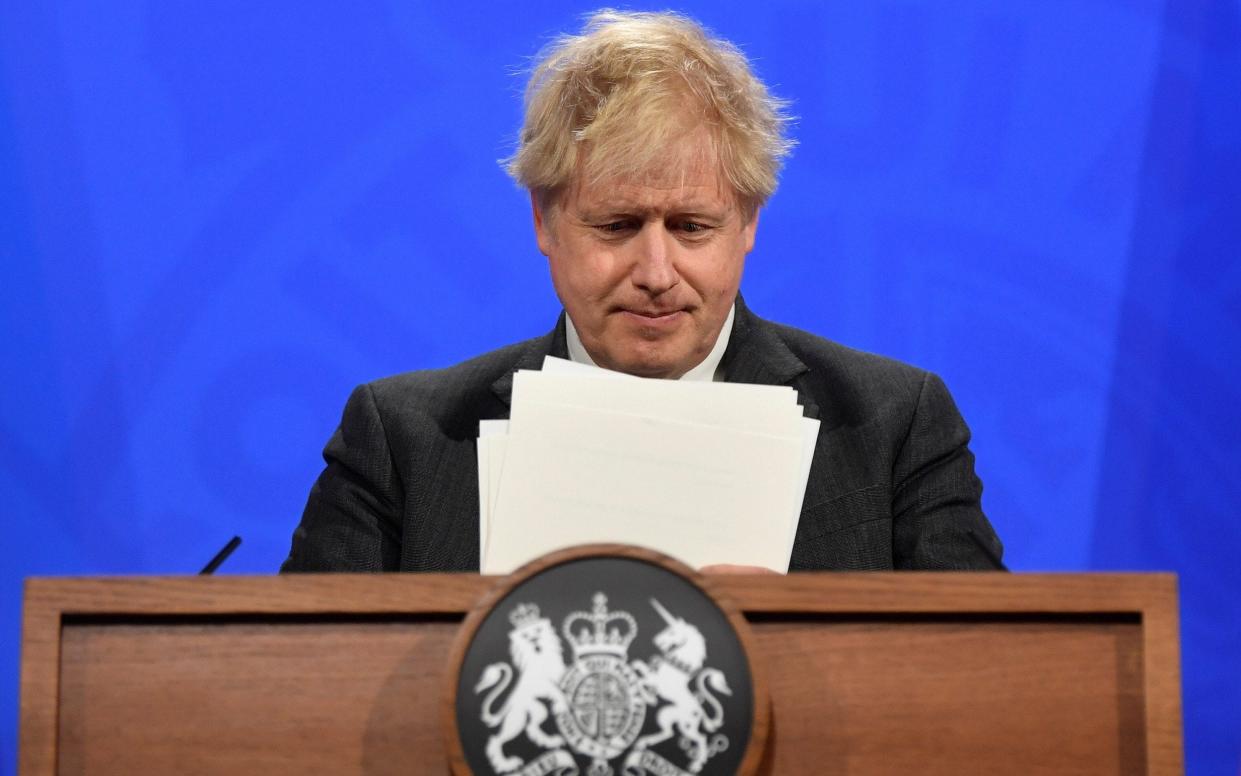Exclusive: Only 32 people hospitalised with Covid after having vaccination

Just 32 vaccinated people were hospitalised with Covid-19 in recent months, according to “extraordinary” real world data showing the effectiveness of Britain’s jabs programme.
The figure represents a tiny fraction of the more than 74,000 people admitted to hospital with the virus during the time period examined in the study.
Scientists are preparing to hand findings to the Government’s advisers on Thursday, showing the dramatic impact of first doses on hospitalisations and deaths.
It comes after Boris Johnson was questioned at a Downing Street press conference on Tuesday over why the Government does not publish statistics showing the number of Covid-19 hospitalisations and deaths among those who have been vaccinated.
The Prime Minister said “we simply don’t know that data”, but added that he “suspected the number was very small”.
The findings revealed by The Telegraph will however raise questions regarding the Government’s caution about the return to normality, and reluctance to promise any new freedoms for those who have been vaccinated.
On Tuesday, Mr Johnson said he saw no reason to deviate from the “cautious but irreversible” roadmap.
He said “science is helping us to get back towards normality” as he set out aims to develop at least two new treatments that people can take at home if they test positive for Covid-19.
Tony Blair will today urge the government to release full data on the vaccine programme, including the number subsequently hospitalised and dying, in order to restore confidence in the Astra Zeneca jab.
The research on Covid-19 patients admitted to UK hospitals examined the outcomes for all patients – including those who had received at least one jab, and had sufficient time to build immunity. Early findings show that of 74,405 Covid-19 cases admitted to hospitals between September and March, just 32 had received a vaccine at least three weeks before.
Scientists said the findings – which amount to around one case per 2,300 patients – showed that vaccines worked “extraordinarily well”, offering protection far above the levels which had been anticipated.
The full data is due to be handed to ministers later this week, after updated findings are passed to the Scientific Advisory Group for Emergencies (Sage) on Wednesday.
Researcher Prof Calum Semple, from the University of Liverpool, said he was “absolutely delighted” by the results so far.
“This is really important,” he said. “What this shows is that in a real-world situation the vaccines are highly effective. Not only do they work, but they work extraordinarily well”.
The findings were particularly remarkable because they related to those given just one jab, he said, with ongoing studies examining the level of protection achieved by two doses.
Updated results, and detailed analysis by the UK Coronavirus Clinical Characterisation Consortium, are due to be handed to Sage on Wednesday, before being passed to ministers.
The detailed findings will examine the rare cases where those vaccinated did end up in hospital with Covid-19, to establish whether such cases were milder than the cases in the unvaccinated, and whether all deaths were prevented.
Prof Semple said the results gave him confidence in the current route of lockdown, with 10 million people now having had both doses of vaccines.
Previously, data published by Public Health England has suggested that one dose of AstraZeneca or Pfizer vaccine prevents against around 80 per cent of hospitalisations, among the over-80s.
And last week, a study by the University of Manchester found that the rate of Covid-19 hospital admissions fell by 75 per cent when vaccinated 80- to 83-year-olds, when compared with their peers, five weeks after getting the Pfizer jab.
Official data on Tuesday showed the number of people in hospital with Covid-19 falling to less than 2,000, for the first time since September.
Deaths have fallen by 24 per cent in the past week, to an average of 33 a day, while the numbers testing positive have fallen by 10 per cent.
Mr Johnson told a Downing Street conference: “We know that this vaccination programme is making a big difference.
“We know that it’s helping to reduce suffering and save lives, potentially on a very big scale. But we don’t yet know the full extent of the protection that we are building up; the exact strength of our defences – and as we look at what is happening in other countries with cases now at record numbers around the world, we cannot delude ourselves that Covid has gone away.”
He said he saw nothing in the current data that led him to believe Britain would have to deviate from the “cautious but irreversible” route out of lockdown.
He added: “The majority of scientific opinion in this country is still firmly of the view that there will be another wave of Covid at some stage this year and so we must – as far as possible – learn to live with this disease, as we live with other diseases.”
In a new report released on Wednesday the Tony Blair Institute for Global Change warns that by choosing not to publish data setting out who has received which vaccine the government is creating a vacuum where “misinformation, fear and confusion thrive”.
The report by the former Prime Minister's think tank urges the government to release full data showing the number of people who have received which vaccine, the age profile of recipients, Covid hospitalisations and deaths as well as side effects in a bid to restore confidence in the “workhorse” Astra Zeneca vaccine in the light of links to blood clots.

 Yahoo News
Yahoo News 
